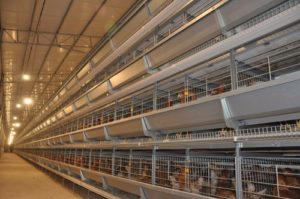The large-scale chicken raising of most farmers prefers to use layer chicken cage . Because of this convenience, the eggshell quality of eggs directly affects the economic benefits of chicken production. Under normal circumstances, the average breakage rate of eggs is 6% to 8%. If you improve the quality of the eggshell and reduce the breakage rate of the egg, it means that the egg level is increased and the income is increased.

The higher the NaCl content in drinking water, the worse the eggshell quality. The content of various minerals in drinking water, especially when the content of NaCl increases, has the greatest impact on eggshell quality. Most chicken farms or large-scale farmers use groundwater as drinking water for cage chickens when they use chicken houses to raise chickens. The salt content of groundwater (mainly NaCl) is higher, resulting in a decrease in eggshell quality and an increase in egg breakage rate. We have done such an experiment. The experiment was conducted with the addition of NaCl to the urban residents as a control group, and the addition of 200-2000 mg/L NaCl was used as the experimental group. The results showed that the higher the NaCl content in the drinking water. The eggshell has a higher breakage rate.
Adding calcium to high NaCl drinking water has no effect on improving the quality of eggshells In order to reduce the breakage rate of eggshells in high-salt drinking water, we added calcium to the diets of laying hens with high salt content in order to improve the quality of eggshells. As a result, when the NaCl content in drinking water was 2 000 mg/L and 10 g/kg of limestone was added to the feed, the quality of the eggshell did not increase. Different weeks old laying hens have different endurance to high NaCl drinking water. The eggs when the laying hens are just opened are smaller than the eggs produced by the old chickens, and the eggshell quality is also poor. When the salt content in the drinking water is increased, the eggshell breakage rate of the aged chicken is higher than that of the young chicken. In laying hens with high salt water, the breakage rate of eggshells is usually as high as 20%, while in aged chickens drinking 2 000 mg/L of salt, the eggshell breakage rate is higher, more than 20% in chicken farm equipment.